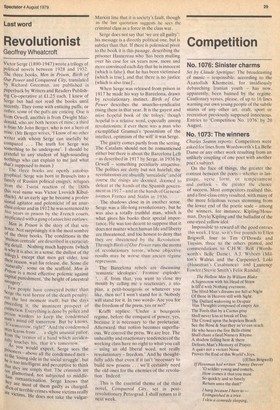Revolutionist
Geoffrey Wheatcroft
Victor Serge (1890-1947) wrote a trilogy of political novels between 1928 and 1932. The three books. Men in prison, Birth of Our Power and Conquered City, translated by Richard Greeman, are published in Paperback by Writers and Readers Publishing Co-operative at £1.25 each. I knew of Serge but had not read the books until recently. They come with enticing puffs; or rather, some of the puffs are enticing. One is from Orwell, another is from Dwight Macdonald, who are both heroes of mine; a third is from Mr John Berger, who is not a hero of mine. (Mr Berger writes, '1 know of no other writer with whom Serge can usefully be Compared . The truth for Serge was something to be undergone'. I should be grateful to any student of high-sounding nothings who can explain to me just what that's supposed to mean.) The three books are openly autobiographical. Serge was born in Brussels into a family of Russian political emigres, refugees from the Tsarist reaction of the 1880s (his real name was Victor Lvovich Kibalchich). At an early age he became a professional agitator and polemicist of an anarchist colour and in 1912 he was sentenced to five years in prison by the French courts, 411 plicated with a gang of anarchist outlaws.
Alen in Prison is the story of that sentence. Not surprisingly it is the most sombre of the three books. The conditions in the ,Maison centrale' are described in excruciat!ng detail. • Nothing much happens (which IS Why it is also, in a sense, the dullest of the trilogy) except that men get older, lose their reason, wait for release, die. Some die .?aturally', some on the scaffold. Men in t-rison is a most effective polemic against Capital punishment, 'the height of ancestral Savagery. Jew people have conveyed better than, 'erge the real horror of the death penalty: nnt the last moment itself, but the days Preceding it, the imminent prospect of extinction. Everything is done by police and Prison warders to keep the condemned 1,1,11111's mind off tomorrow. But he knows. les tomorrow, right?' 'And the condemned Tan learns from . . . a slight unusual pallor, .1.(1111 the tremor of a hand which acciden touches his, that it's tomorrow.' As You would expect, Serge sees the ,Prisoners — above all the condemned men — _ ak Itte 'losing side in the social struggle', but ,,e, Is too intelligent and perceptive to think 1..rlat they are simply that. The criminals are °: glamorised, not subjected to middle"css romanticisation. Serge knows that " Y are most of them guilty as charged, )ften of terrible crimes whose victims really Ire Victims He does not take the vulgar Marxist line that it is society's lault, though as the last quotation suggests he sees the criminal class as a force in the class war.
Serge does not say that 'we are all guilty': his message is a directly political one, but is subtler than that. If there is polemical pivot to the book it is this passage, describing the prisoner Hautereau who 'has been mulling over his case for six years now, more and more convinced each day that he is innocent (which is false), that he has been victimised (which is true), and that there is no justice (which is also true)'.
When Serge was released from prison in 1917 he made his way to Barcelona, drawn by revolutionary instinct. Birth of Our Power describes the .anarcho-syndicalist rising there in that year. It is the gayest and most hopeful book of the trilogy, though hopeful is a relative word, especially among revolutionists: if ever there was a man who exemplified Gramsci's 'pessimism of the intellect, optimism of the will' it was Serge.
The gaiety comes partly from the setting. The Catalans should not be romanticised either but there is about the Barcelona Left — as described in 1917 by Serge, in 1936 by Orwell — something peculiarly attractive. The politics are dotty but not hateful; the revolutionists are absurdly 'unrealistic': and of course the risings are doomed. doomed to defeat at t he hands of the Spanish government in 1917—and at the hands of Generalissimos Franco and Stalin in 1936.
The shadows close in in another sense. Serge was a life-long revolutionary, but he was also a totally truthful man, which is what gives his books their special importance. He was too decent to suppose that it does not matter when human life and liberty are threatened, and too honest to deny that they are threatened by the Revolution. Through Birth of 0w Power runs the motto of revolutionary terror, whose objective results may be worse than ancien r4ime repression.
The Barcelona rebels are discussing 'romantic ideologies'. Fromine explodes: . if, from that, you want to close my mouth by calling me a reactionary, a utopian, a petit-bourgeois or whatever you like, then no! I won't stand for it. Nobody will stand for it. In two wordsAre you for the freedom of the press, yes or no?'
Krafft replies: 'Under a bourgeois regime, before the conquest of power, yes. because it is necessary to the proletariat. Afterward, that notion becomes superfluous. We control the press. We are free. The unhealthy and reactionary tendencies of the working class have no right to what you call — using an old liberal word, not really revolutionary — freedom.' And he thoughtfully adds that even if it isn't 'necessary to build new prisons . . we'll certainly need the old ones for the enemies of the revolution, Indeed.
This is the essential theme of the third novel, Conquered City, set in postrevolutionary Petrograd. I shall return to it next week.


































 Previous page
Previous page